In Costa Rica rainforests, butterflies with defects soon become part of the food chain. When raising caterpillars and butterflies inside an enclosed area, injuries and disease can be observed first hand. Some of the problems a caterpillar may encounter are bacterial diseases, defects during development, or falling before the butterflies wings are completely dry. Watching a butterfly struggle as it tries to overcome its impairment is saddening. I have also learned that in the wild the survival rate of an egg making it to a butterfly is less than 10%! By rearing caterpillars in captivity this can be reversed so that up to 90% can survive to be butterflies.
Bacterial Infections
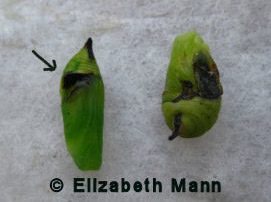 Raising caterpillars in captivity has many benefits, but it has disadvantages as well. I have had as many as forty caterpillars in one container. The result was that the active caterpillars began to crawl over the soft chrysalises before they hardened resulting in damage. Some chrysalises became disfigured or got punctured allowing unwanted bacteria to enter. Also, the abundance of waste was difficult to manage. One way to overcome this problem is to gently remove the caterpillars before they make a chrysalis. The finding of this experiment was that the maximum of 20 caterpillars per my 12” x 8” container is the most effective way to prevent overcrowding problems. Raising caterpillars in captivity has many benefits, but it has disadvantages as well. I have had as many as forty caterpillars in one container. The result was that the active caterpillars began to crawl over the soft chrysalises before they hardened resulting in damage. Some chrysalises became disfigured or got punctured allowing unwanted bacteria to enter. Also, the abundance of waste was difficult to manage. One way to overcome this problem is to gently remove the caterpillars before they make a chrysalis. The finding of this experiment was that the maximum of 20 caterpillars per my 12” x 8” container is the most effective way to prevent overcrowding problems.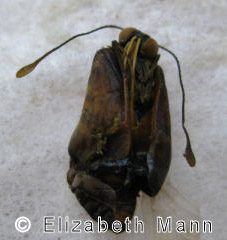 To complete my research on bacterial infections, I decided to open one of the punctured chrysalis effected by overcrowding. With the help of tweezers, I gently removed the thin chrysalis covering. My discovery was that bacteria had entered and began to eat away at the once developing White Peacock butterfly. The butterfly was dark brown, and mushy. Its antennae, eyes, proboscis, wings, and abdomen were packed neatly inside. Its proboscis was still two separate pieces instead of one long tube. Looking inside was unpleasant, but I learned what the effect is of bacteria attacking a chrysalis. Infected chrysalises in captivity should be removed and disposed of properly. I put mine in a sealed container and put it inside the freezer before getting rid of it. To complete my research on bacterial infections, I decided to open one of the punctured chrysalis effected by overcrowding. With the help of tweezers, I gently removed the thin chrysalis covering. My discovery was that bacteria had entered and began to eat away at the once developing White Peacock butterfly. The butterfly was dark brown, and mushy. Its antennae, eyes, proboscis, wings, and abdomen were packed neatly inside. Its proboscis was still two separate pieces instead of one long tube. Looking inside was unpleasant, but I learned what the effect is of bacteria attacking a chrysalis. Infected chrysalises in captivity should be removed and disposed of properly. I put mine in a sealed container and put it inside the freezer before getting rid of it. |
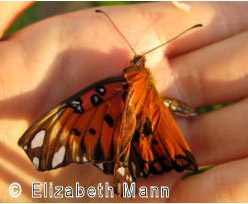 Wing Damage of Fallen Butterflies Wing Damage of Fallen Butterflies
Butterflies have soft wings when they first emerge. Loosing their grip as they are hanging to dry can be fatal. They quickly are snatched by a lizard, bird, or other creatures. Raising butterflies in an enclosed area gives you more control. If the fallen butterfly has minimal damage, it can be safely transferred to an object to finish drying. Most of the time the butterfly is found too late. |
| Defects During Development
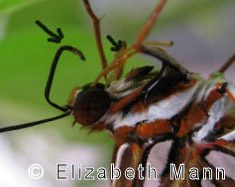 Defects can occur while the butterfly is developing inside the chrysalis. These defects are probably caused genetically resulting in abnormal features in the butterfly. Butterflies can emerge with disfigured wings, missing body parts, or face damage. I had a Gulf Fritillary butterfly emerge with one deformed antennae and a short split proboscis. The defects can result in death for a butterfly. Defects can occur while the butterfly is developing inside the chrysalis. These defects are probably caused genetically resulting in abnormal features in the butterfly. Butterflies can emerge with disfigured wings, missing body parts, or face damage. I had a Gulf Fritillary butterfly emerge with one deformed antennae and a short split proboscis. The defects can result in death for a butterfly.
|
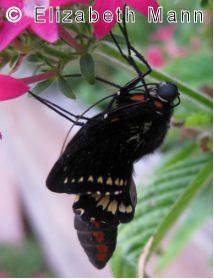 Defects can vary and be interesting to observe. On one of my Polydamas Swallowtail butterflies, I discovered a strange defect. Its abdomen was abnormally large causing it to get stuck in its own chrysalis. After helping it out of the casing, I noticed its hindwings and forewings were too small for flight. All it could do was hang because its tiny wings could not carry its large body. When I came back the next hour, it had disappeared, obviously eaten by a predator. These are just some of the defects I have observed while raising butterflies. Defects can vary and be interesting to observe. On one of my Polydamas Swallowtail butterflies, I discovered a strange defect. Its abdomen was abnormally large causing it to get stuck in its own chrysalis. After helping it out of the casing, I noticed its hindwings and forewings were too small for flight. All it could do was hang because its tiny wings could not carry its large body. When I came back the next hour, it had disappeared, obviously eaten by a predator. These are just some of the defects I have observed while raising butterflies. |
 Wing Damage of Fallen Butterflies
Wing Damage of Fallen Butterflies
 Defects can vary and be interesting to observe. On one of my Polydamas Swallowtail butterflies, I discovered a strange defect. Its abdomen was abnormally large causing it to get stuck in its own chrysalis. After helping it out of the casing, I noticed its hindwings and forewings were too small for flight. All it could do was hang because its tiny wings could not carry its large body. When I came back the next hour, it had disappeared, obviously eaten by a predator. These are just some of the defects I have observed while raising butterflies.
Defects can vary and be interesting to observe. On one of my Polydamas Swallowtail butterflies, I discovered a strange defect. Its abdomen was abnormally large causing it to get stuck in its own chrysalis. After helping it out of the casing, I noticed its hindwings and forewings were too small for flight. All it could do was hang because its tiny wings could not carry its large body. When I came back the next hour, it had disappeared, obviously eaten by a predator. These are just some of the defects I have observed while raising butterflies.

 To complete my research on bacterial infections, I decided to open one of the punctured chrysalis effected by overcrowding. With the help of tweezers, I gently removed the thin chrysalis covering. My discovery was that bacteria had entered and began to eat away at the once developing White Peacock butterfly. The butterfly was dark brown, and mushy. Its antennae, eyes, proboscis, wings, and abdomen were packed neatly inside. Its proboscis was still two separate pieces instead of one long tube. Looking inside was unpleasant, but I learned what the effect is of bacteria attacking a chrysalis. Infected chrysalises in captivity should be removed and disposed of properly. I put mine in a sealed container and put it inside the freezer before getting rid of it.
To complete my research on bacterial infections, I decided to open one of the punctured chrysalis effected by overcrowding. With the help of tweezers, I gently removed the thin chrysalis covering. My discovery was that bacteria had entered and began to eat away at the once developing White Peacock butterfly. The butterfly was dark brown, and mushy. Its antennae, eyes, proboscis, wings, and abdomen were packed neatly inside. Its proboscis was still two separate pieces instead of one long tube. Looking inside was unpleasant, but I learned what the effect is of bacteria attacking a chrysalis. Infected chrysalises in captivity should be removed and disposed of properly. I put mine in a sealed container and put it inside the freezer before getting rid of it. Defects can occur while the butterfly is developing inside the chrysalis. These defects are probably caused genetically resulting in abnormal features in the butterfly. Butterflies can emerge with disfigured wings, missing body parts, or face damage. I had a Gulf Fritillary butterfly emerge with one deformed antennae and a short split proboscis. The defects can result in death for a butterfly.
Defects can occur while the butterfly is developing inside the chrysalis. These defects are probably caused genetically resulting in abnormal features in the butterfly. Butterflies can emerge with disfigured wings, missing body parts, or face damage. I had a Gulf Fritillary butterfly emerge with one deformed antennae and a short split proboscis. The defects can result in death for a butterfly.